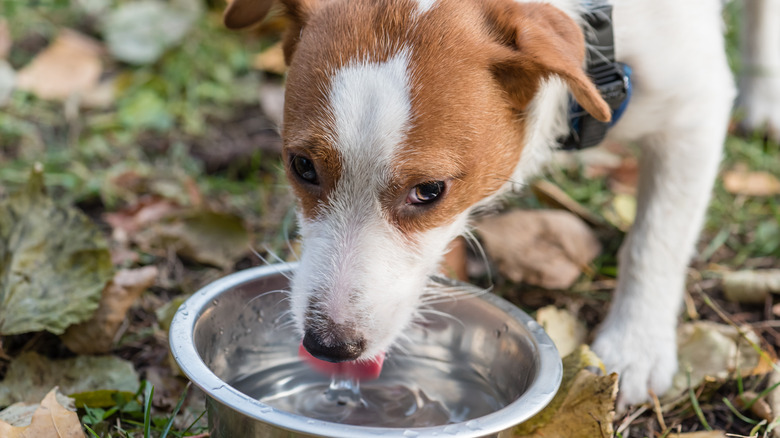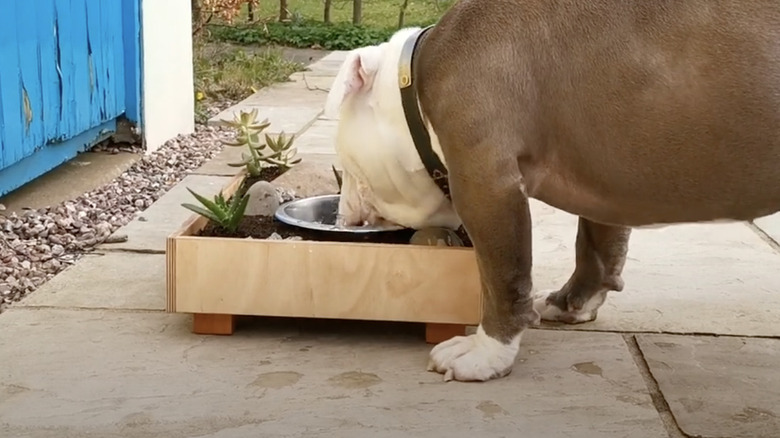The Easy Way Dog Owners Can Water Their Houseplants & Avoid A Mess
We may receive a commission on purchases made from links.
You might have seen something similar already: a dog's water bowl surrounded by lush vegetation that looks like it came straight out of FernGully. This trend isn't just a fad, however. It's actually an ingenious way to water your plants and keep your furry friends from making a mess when they get a drink. If your pet likes to make a splash whenever they need to hydrate, why not take advantage of the leftover moisture by securing their bowl in a planter so your green leafy loves can also benefit? Not only is this trick super simple, but it will turn your watering station into a lush, aesthetically pleasing indoor garden that can almost water itself!
The only supplies you'll need for this project are your dog's water bowl, a planter, soil, rocks, and your plants. You can also use any pet-safe ceramic dish or bowl if their current water option doesn't match your desired aesthetics. Keep in mind, the more plants you surround the dog's bowl with, the less you'll notice it, so they don't need to be the main focus of your project. There are pros and cons of stainless steel vs ceramic bowls, so if you're more concerned about durability and rust, stick with the former. If you like the way ceramic looks, these are still easy to sanitize but can stain, so keep that in mind when choosing a color for your planter.
Build a mini-garden around your dog's water dish
The most important part of this entire trend is finding dog-safe plants to use in your planter. Your pet will be interacting with these fauna, so they cannot be toxic to dogs in any way. Succulents like portulacaria, echeveria, or aeoniumare excellent choices because they have shallow root systems. If you're using succulents, be careful with spiky options that could irritate your pet's skin as they drink, and make sure to research everything you should know about succulents before planting. You can also use rabbit's foot fern, hoya plants in a variety of options, and spider plants to name a few. Check the ASPCA website to determine which species will work for you and your furry friend for peace of mind, too!
If you don't have a planter already, you can use a metal tray like this galvanized metal option from Amazon, or a terra cotta bowl like this one on Amazon. You need to have a base that can fit both your pet's bowl and a border of plants around it. If you prefer to build a box rather than use a tray, that is another attractive option. Avoid overfilling or picking something too small, as your plants could struggle to thrive. To ensure proper drainage if your pet is a super slurper, add a layer of pebbles or hydro granules before your soil to avoid root rot.
Let your dog's excess keep your plants hydrated
To make your water bowl planter, add a layer of potting soil that works with your plant species. Use a cheap plastic bowl about the same size and shape as your dogs water dish to elevate it above the plants by placing it in the middle of the metal tray or planter. You can either keep it so the opening is facing upwards, or upside down depending on how deep your metal tray is.
As your pet drinks, the leftover water will splash onto the plants to keep them hydrated, while the added drainage will ensure plants won't suffer from root rot. If you keep this DIY water dish planter outdoors where the temperatures hover below 40 degrees Fahrenheit, care for houseplants and succulents in the winter by moving them indoors or to a warmer area.
Not only does this DIY utilize spilled moisture, but it adds greenery to your home in an area that doesn't require added space. Your little dog-friendly garden will even elevate their drinking area, and house plants can be beneficial to your health, too. Turning a water bowl mess into a lush, leafy drinking station might be one of the most clever projects around — now if only there were a creative way to work around other pet messes!

